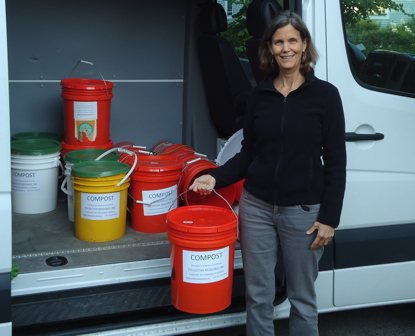Until the city of Chicago and nearby municipalities launch their own curbside food composting programs, Erlene Howard’s start-up pick-up service is filling a gap in the local green garbage landscape.
The Evanston-based bookkeeper was dismayed at the lack of good choices for composting the food scraps generated from her raw and vegan diet a couple of years ago. She couldn’t put a composting bin in the cramped backyard of her condo building, and city regulations wouldn’t allow her to pool her leftovers with others in a neighbor’s yard.
After much research, the 52-year-old mom says she found no one on Chicago’s North Side or northern suburbs giving people the option of a door-to-door service that would divert their rotting banana peels, stale bread and chicken bones from methane-emitting landfills. She was determined to find a way to instead deliver residential leftovers to a commercial compost site where scraps are converted into useful fertilizer.
Erlene Howard
Ms. Howard started Collective Resource Inc. in spring 2010 when she found others like herself looking for similar solutions. She learned the ropes from Chicago’s urban agriculture maven Ken Dunn, who runs the non-profit Resource Center, which hauls away food waste for mid-sized businesses and other organizations.
Her timing was good. The Illinois Legislature passed a law in January 2010 permitting restaurants and other commercial establishments to set aside their food scraps from the rest of their garbage so the scraps could be hauled away separately. It took Ms. Howard six months to cart away her first ton of stinky leftovers from a handful of customers via her Toyota Camry to Land & Lakes, a commercial compost center at 122nd Street. Her business has since grown, and Ms. Howard’s son Kevin now hauls about a ton a week from residential and commercial clients in a cargo van. She estimates that Collective Resource has diverted about 17 tons of food scraps to date from landfills.
About 20% of Collective Resource’s clients are non-residential, including restaurants (Tweet . . . Let’s Eat), churches and schools. Ms. Howard expects those segments of her business to grow in the near term. A recent addition to her roster is the Academy for Global Citizenship, a Chicago public charter school and darling of the local food scene because of its program of growing organic veggies onsite and feeding organic meals twice daily to its students. She says she is also in discussions with Jones Lang LaSalle Inc., a commercial real estate firm, and other commercial building managers.
Crain’s caught up with Ms. Howard earlier this week between pickups to learn more about her strategy.
Crain’s: How much of your time is allocated to your composting business, and when do you think you’ll be able to make it a full-time gig?Ms. Howard: I spend about two-thirds of my time and all of my energy on the composting business, but I hope to quit my bookkeeping work once the waste-hauling enterprise is more sustainable. Right now my revenues are split 50-50 between the two businesses.
We’re in a position to increase five times what we are currently hauling without having to make another large asset purchase. When our current customer base doubles, Collective Resource will be self-sustaining, and we see that happening before March 2012. The company is projected to grow to three full-time and three part-time employees hauling 11 tons a week by our third birthday, June 2013.
Crain’s: How do you get new customers? Is it difficult to get people to sign up?
Ms. Howard: Our customers continue to come mostly from word of mouth. In some ways it’s a tough sell because there are very educated people who don’t understand that food scraps are the best fertilizer. Many people also don’t know that if you put food scraps in a landfill, we create the pollution problem of methane.
I’m connecting with green-minded people who have disposable income where they regularly have lawn care service and other regular services, so they’re willing to spend the money on composting, too. I also have clients who may not have as much money but they’re concerned about teaching their children the importance of diverting waste from landfills. It’s really my commercial clients that are growing in leaps and bounds. I’m also working with Mary Beth Scheye, a zero-waste consultant, who works on events and other projects with me. And we’re also members of the Business Alliance for a Sustainable Evanston and we’ll be part of group ads with them this fall.
Crain’s: What would happen to your operation if the city of Chicago and suburban municipalities decide to start composting programs that don’t charge for services?
Ms. Howard: Maybe the city would hire me for my expertise. I don’t think it will happen soon enough that my efforts would have been a waste of time. The city of Glencoe hauls its own garbage away, and I know there are people there who are pushing for a composting program. Anyway, there’s warmer climates that need composting services, too.
Crain’s: More concert and festival producers are adding composting to green up their events. Tell us about some of the perks you’ve enjoyed on that front.Ms. Howard: The production crew Effect Partners, which produced the U2 concert, asked us to compost for them July 5. We had a great night. We pulled into the loading dock at Soldier Field, loaded up the truck with food scraps and compostable disposables, then had the honor of seeing the U2 concert up close for free. We were closer than anybody who bought a ticket for the show that night. We did it for barter, but I got the good end of the deal.


